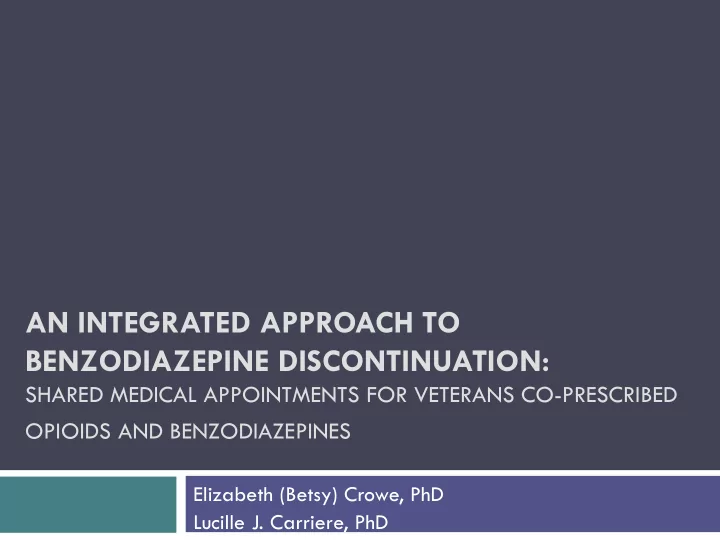

AN INTEGRATED APPROACH TO BENZODIAZEPINE DISCONTINUATION: SHARED MEDICAL APPOINTMENTS FOR VETERANS CO-PRESCRIBED OPIOIDS AND BENZODIAZEPINES Elizabeth (Betsy) Crowe, PhD Lucille J. Carriere, PhD
Objectives Review current relevance to Veteran healthcare Explain the importance of interdisciplinary efforts in benzodiazepine discontinuation Describe the Opioid/Benzodiazepine SMA Discuss conclusions and lessons learned
Opioid + Benzodiazepine Use in Veterans 422,786 Veterans on Opioids 27% on Benzodiazepine prescribing also on Benzo patterns and deaths from drug overdose among US 2,400 veterans receiving opioid Fatal ODs analgesics: case-cohort study. BMJ. 2015. Benzo prescribed in ~50% of fatal ODs Park TW et al. BMJ. 2015
Benzodiazepine Discontinuation
Why Discontinue Benzos? No long-term indication Safety Concerns Falls Hip fractures Sedation Psychological concerns Cognitive impairment Dependence Barrier to psychotherapeutic progress
Benzodiazepine Discontinuation Gradual tapering alone has limited effectiveness 50-60% of users resume medication “ Providing individuals with advice to cease benzodiazepine use or with a more extensive intervention increases cessation rates significantly in comparison with routine care. ” Parr et al. 2008. 6
Role of Psychology
Role of Psychology Effective benzodiazepine discontinuation must include: Decrease conditioned fears of somatic sensations Provide patients with coping skills for managing anxiety Provide patients with skills for minimizing withdrawal symptoms Otto et al., 2002
Role of Psychology General psychology skills Values and goals identification Motivational Interviewing 9
Role of Psychology Taper + CBT = Best Discontinuation Results (Morin et al., 2004; Baillargeon et al., 2003) Taper + CBT = More successful dose reduction than taper alone (Voshaar et al., 2003)
Shared Medical Appointment
SMA Clinical Group Group Target Structure Population Facilitators Supervisors 6 shared medical 1 Mental Health Psychology Post- appointment (SMA) Clinical Pharmacy Doctoral Fellow sessions Specialist Veterans prescribed chronic opioid and 90 minute SMA benzodiazepine therapy PGY-2 Psychiatric 2 Licensed Clinical (60 min group Pharmacy Resident Psychologists content, 30 min individual check-in) Individual sessions offered for patients not appropriate for group setting 12
SMA Content Risk Education / Non-benzo Non-Pharm Pain Naloxone Pharmacotherapy Management Distribution Options Strategies Insomnia PTSD and Psychoeducation Management Benzodiazepines Strategies Relaxation Individualized Cognitive Strategies / Taper Reappraisals Mindfulness Recommendations Techniques 13
SMA Results
Results: Interim Data High Risk Percentage Comorbidity (n=number (N=11) of patients) Average ± Standard Baseline PTSD 45.5% (n=5) Characteristics Deviation (Range) Chronic Respiratory (N = 11) 36.4% (n=4) Disease Male Gender 91% Sleep Apnea 45.5%(n=5) 64 ± 8.6 (50 – 74) Age (years) Elderly (>65 years) 54.5% (n=6) Race (Caucasian) 91% Dementia 9.1% (n=1) 48 ± 10.96 RIOSORD Score (34 – 65) 15
Results: Interim Data Primary Psychiatric Percentage Average ± Baseline Diagnoses (n = number of Assessment Standard patients) Scores Deviation PTSD 27.3% (n=3) 9.7 ± 6.18 PHQ-9 Other specified trauma - 6.33 ± 6.03 GAD-7 and stressor-related 9.1% (n=1) 22.62 ± 16.46 disorder PCL-5 1 ± 1.63 AUDIT-C 9.1% (n=1) General Anxiety Disorder 12.9 ± 5.73 ISI Unspecified Anxiety 36.4% (n=4) 1 ± 0.41 DAST-10 Disorder Major Depressive Disorder 18.2% (n=2) 16
Results: Interim Data Benzodiazepine Taper Progress Patients who have completed/currently enrolled in SMA 35 Diazepam Dose Equivalents (mg) 30 25 A (Fall16) 20 B (Fall16) D (Spring17) 15 E (Spring17) 10 F (Spring17) 5 0 Baseline Current 17
Lessons Learned
Lessons Learned: Interprofessional Competencies Interprofessional Roles & Responsibilities Communication Responsive Mutual and dependence responsible Recognize Consensus one’s on ethical limitations principles
Lessons Learned: SMA Content Cognitive Patient component: understanding: Taper-specific Repetition is key!
Lessons Learned: System-Level Interprofessional emphasis of Provider buy-in facility Various Add psychiatry Modalities: to SMA team Individual SMAs, CVT
Acknowledgements Lucille J. Carriere, Ph.D. Caitlin Dirvonas, Pharm.D., BCPS, PGY-2 Psychiatric Pharmacy Resident Scott Fernelius, Ph.D., Psychology Postdoctoral Fellow Ashley Barroquillo, Psy.D., Licensed Clinical Psychology Jennifer Bean, Pharm.D., BCPS, BCPP
Recommend
More recommend